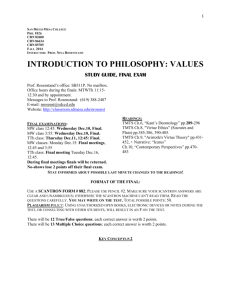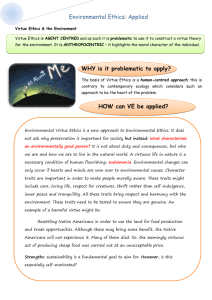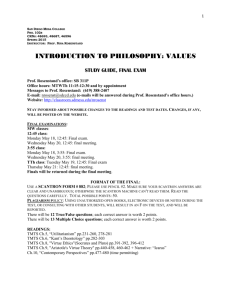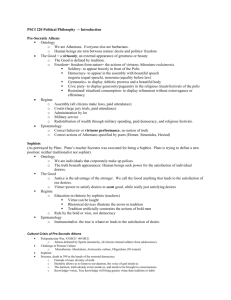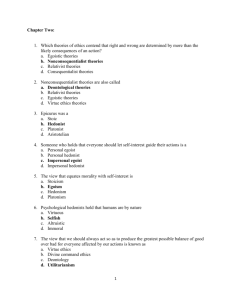final study guide
advertisement
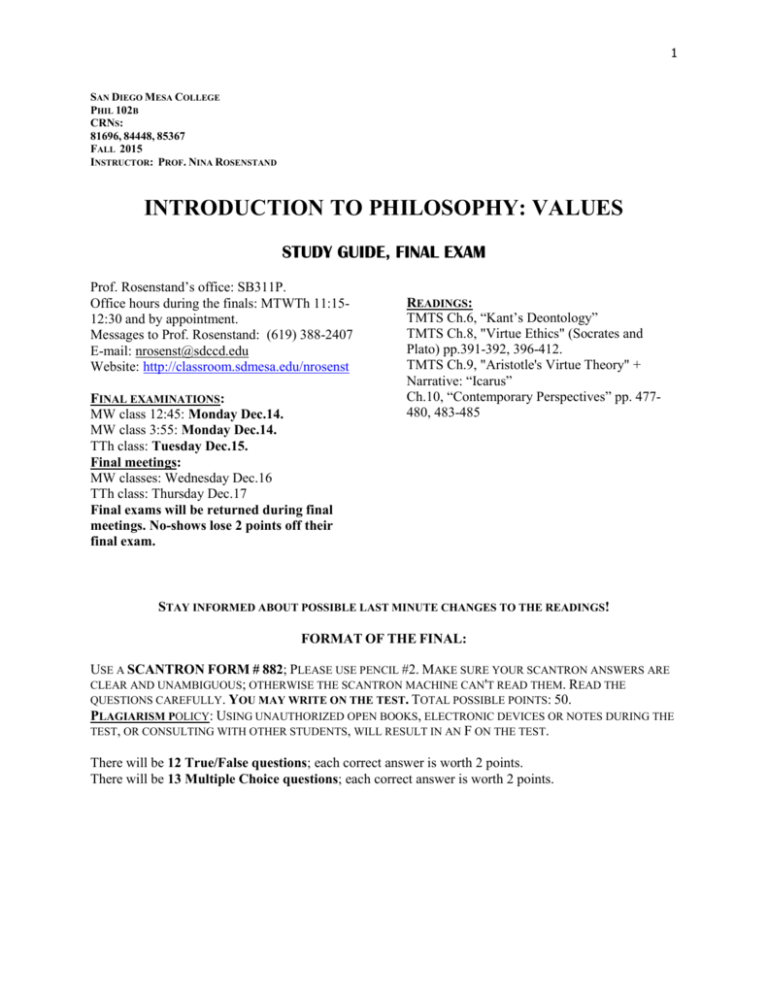
1 SAN DIEGO MESA COLLEGE PHIL 102B CRNS: 81696, 84448, 85367 FALL 2015 INSTRUCTOR: PROF. NINA ROSENSTAND INTRODUCTION TO PHILOSOPHY: VALUES STUDY GUIDE, FINAL EXAM Prof. Rosenstand’s office: SB311P. Office hours during the finals: MTWTh 11:1512:30 and by appointment. Messages to Prof. Rosenstand: (619) 388-2407 E-mail: nrosenst@sdccd.edu Website: http://classroom.sdmesa.edu/nrosenst FINAL EXAMINATIONS: MW class 12:45: Monday Dec.14. MW class 3:55: Monday Dec.14. TTh class: Tuesday Dec.15. Final meetings: MW classes: Wednesday Dec.16 TTh class: Thursday Dec.17 Final exams will be returned during final meetings. No-shows lose 2 points off their final exam. READINGS: TMTS Ch.6, “Kant’s Deontology” TMTS Ch.8, "Virtue Ethics" (Socrates and Plato) pp.391-392, 396-412. TMTS Ch.9, "Aristotle's Virtue Theory" + Narrative: “Icarus” Ch.10, “Contemporary Perspectives” pp. 477480, 483-485 STAY INFORMED ABOUT POSSIBLE LAST MINUTE CHANGES TO THE READINGS! FORMAT OF THE FINAL: USE A SCANTRON FORM # 882; PLEASE USE PENCIL #2. MAKE SURE YOUR SCANTRON ANSWERS ARE CLEAR AND UNAMBIGUOUS; OTHERWISE THE SCANTRON MACHINE CAN'T READ THEM. READ THE QUESTIONS CAREFULLY. YOU MAY WRITE ON THE TEST. TOTAL POSSIBLE POINTS: 50. PLAGIARISM POLICY: USING UNAUTHORIZED OPEN BOOKS, ELECTRONIC DEVICES OR NOTES DURING THE TEST, OR CONSULTING WITH OTHER STUDENTS, WILL RESULT IN AN F ON THE TEST. There will be 12 True/False questions; each correct answer is worth 2 points. There will be 13 Multiple Choice questions; each correct answer is worth 2 points. 2 KEY CONCEPTS Ch.6 Immanuel Kant, German philosopher Socrates: People do morally wrong acts out of The good will: good intentions to respect moral ignorance law; consequences don’t count Socrates’ 3 parts of the psyche: reason, willpower, “The good will shines like a jewel by its own light” appetites (desires) The store owner’s 4 options 3 corresponding virtues: wisdom, courage, hypothetical imperatives: If I want X, then I must do Y, conditional command temperance The categorical imperative: Absolute moral Freud’s three parts of the psyche, inspired by command Plato’s Republic: id, ego, superego Structure of cat.imp.: State your maxim, Plato opens up the first adult school, the Academy universalize it, ask if it is rational. Maxim = principle for an action Plato’s three sections of the ideal state: philosopherUniversalization = making a maxim into a universal kings, police & military, and the general population law Women’s place in the ideal state determined by Example: the man who wants to borrow money talent, not gender. So: women in gov’t, and autonomous lawmaker = using cat.imp. to set moral rules for oneself military. Kant’s assumption: reason is universal Primary Reading: The Republic: the virtue of 5 Criticisms: 1) Mill: Kant is referring to reason corresponds to wisdom, the “spirited part” consequences; 2) cat.imp. doesn’t solve conflict (willpower) corresponds to courage, and controlled between duties; 3) the loophole, making the maxim appetites correspond to temperance. The combined too specific; 4) What is rationality? Depends on goal; 5) Cat.imp. allows for no exceptions virtue is justice. (example: the killer at the door) Intrinsic value vs. instrumental value Ch.9 Kant: rational beings should be treated as “ends-inAristotle had ambitions to take over Plato’s school, themselves” with intrinsic value but never succeeded. He opened up his own school, “Ends in themselves”: respect for rational beings including yourself the Lyceum. “Merely a means to an end” = instrumental value Aristotle's theory of four causes: material, efficient, only (taking advantage of others) formal, final “Means to an end” is not the same as “merely a teleology: theory of purpose means to an end” (use vs. abuse, disrespect) teleological explanation vs. causal explanation Rational persons vs. non-rational things/animals Problems: what about humans who are not rational, (“giraffes”) and animals the Golden Mean= relative mean between extremes Kant regarded animals as things of excess and deficiency Kant’s last book: invented hybrid concept inexamples of virtues (courage, pride, anger, etc.) between “person” and “thing,” for humans. Not for happiness (eudaimonia) is the reward of virtue animals. But Kant was against animal experiments. Aristotle had enormous influence on Western and Kingdom of Ends: Kant’s utopia, using cat. imp. Middle Eastern thinking. and treating people with respect Problems with ancient virtue ethics: undemocratic; can’t solve difference of opinion. Narrative: “The Flight of Icarus”: the Golden Ch.8 Mean: not too high, not too low ethics of conduct (what to do?) vs. virtue ethics (how to be?) Ch.10 Christianity (God gets credit for good character) The late 20th century revival of virtue ethics eliminated ancient virtue ethics (you take credit for Negative role models teach good lessons creating your own good character) Kant did not approve of role models virtue (arete: excellence) The political aspect of conduct vs. character The charges against Socrates: offending gods, Foot: Reintroduced virtue ethics. Virtue is a matter corrupting youth of good intentions, not just a good disposition Socrates’ final words: owing a rooster to Asclepius Socratic method (dialectic method) opinion (doxa) vs. knowledge (episteme)
